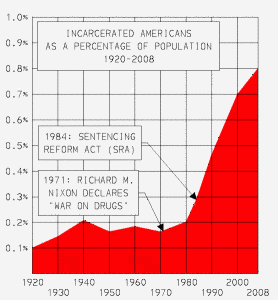(The following statistics are from the US; however, policies and their outcomes in the UK are in alignment with those of the US in this epic saga of unintended consequences.)
 According to the Drug Policy Alliance,
According to the Drug Policy Alliance,
- The US spends over fifty-one billion dollars each year in the War on Drugs.
- Potential tax revenue if drugs were taxed at rates similar to those on alcohol and cigarettes is estimated to be over forty-five billion dollars.
- One and a half million people were arrested in the US in 2012 for non-violent drugs charges.
- Two and a quarter million people were in US prisons or jails in 2012—or just under 1 person per hundred, the highest rate in the world.
- Over half a million people were arrested in 2012 on marijuana charges.
- Over thirty-eight thousand people died from drug overdose in 2012.
- Syringe sharing is estimated to be responsible for over thirty-three percent of AIDS cases.
If we add the enforcement expenditures (fifty-one billion) to the potential tax revenue (forty-five billion), we get nearly one hundred billion dollars that could be directed toward treatment and prevention.
Furthermore, if we were to change policy,
- Criminals would not be able to profit from the drug market.
- Violence engendered by drug profits would be eliminated.
- Money spent by arrested users on bail, lawyers, and fines could circulate more effectively in the economy.
- Overdoses could be minimized with harm-prevention strategies.
- The spread of HIV through contaminated needles would be minimized.
- Criminal behavior among drug users would be reduced
- Marginalization of drug users—recreational as well as problematic—would cease, and users could be channeled back to productivity.
 Consider this common scenario: A male in his early twenties, employed but barely getting by, gets arrested for marijuana. His car gets towed. He loses days at work. He has to post bail. If he gets processed into a county jail, especially on a weekend, his vehicle impound can exceed $500. If he can’t bail the car out, he loses it. The experience can derail a young life. For minorities, this scenario is even more common.
Consider this common scenario: A male in his early twenties, employed but barely getting by, gets arrested for marijuana. His car gets towed. He loses days at work. He has to post bail. If he gets processed into a county jail, especially on a weekend, his vehicle impound can exceed $500. If he can’t bail the car out, he loses it. The experience can derail a young life. For minorities, this scenario is even more common.
Other countries, (for example, Columbia) are re-examining their drug policies. There is absolutely no evidence to support the supposition that maintaining current policy is cost-effective, morally correct, or leading toward an eventual solution. Fearmongering by politicians and opposition by those with a vested interest in the status quo (drug enforcement beaurocracies, prison guard unions, alcohol industry, and others) have propped up the failing War on Drugs for far too long.
Latest posts by Darren Lockie (see all)
- Cocaine burnout - February 25, 2020
- What is pathological lying? - February 21, 2020
- Ireland’s growing drug problem - January 20, 2020
+66 8 7140 7788








